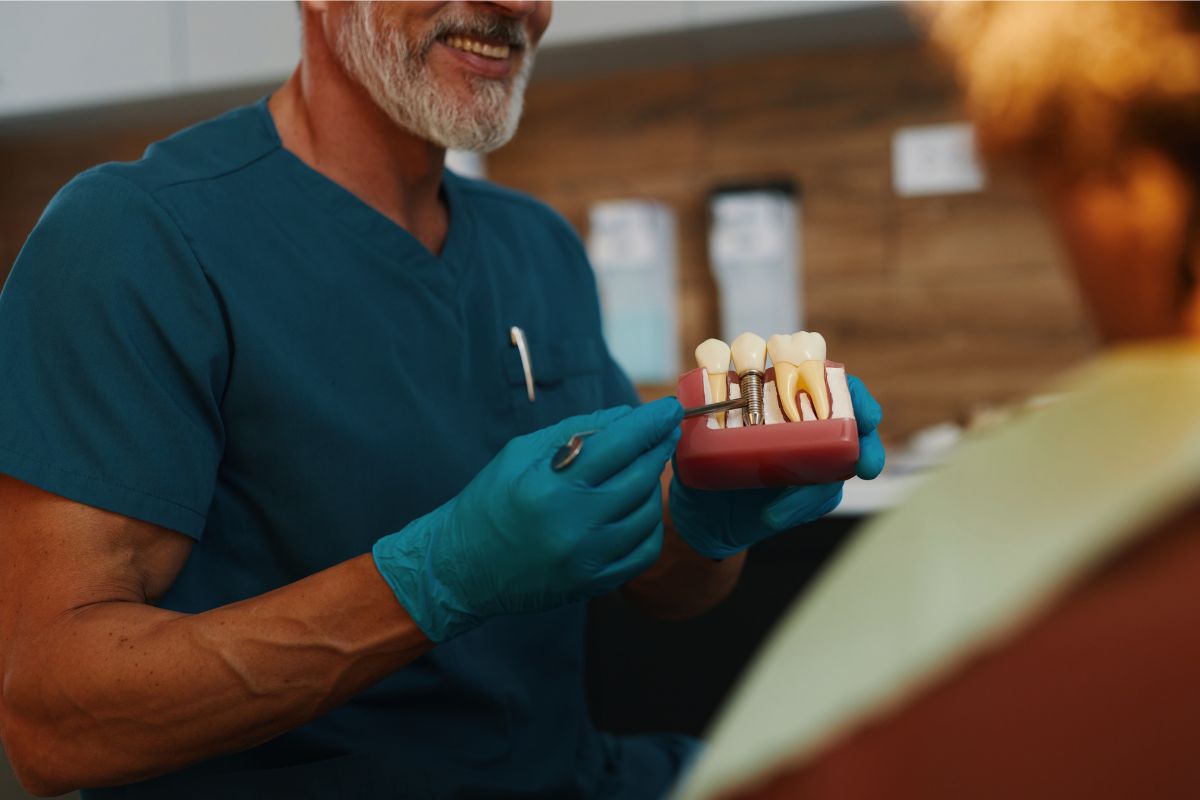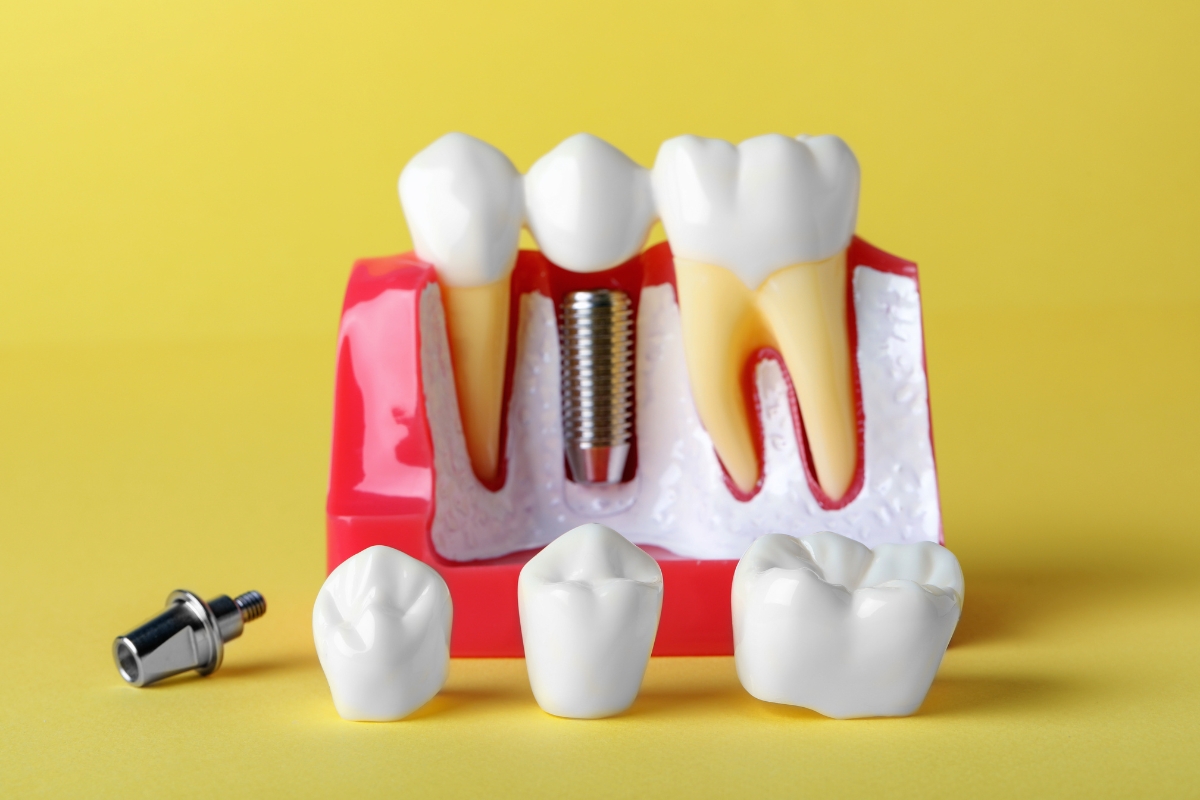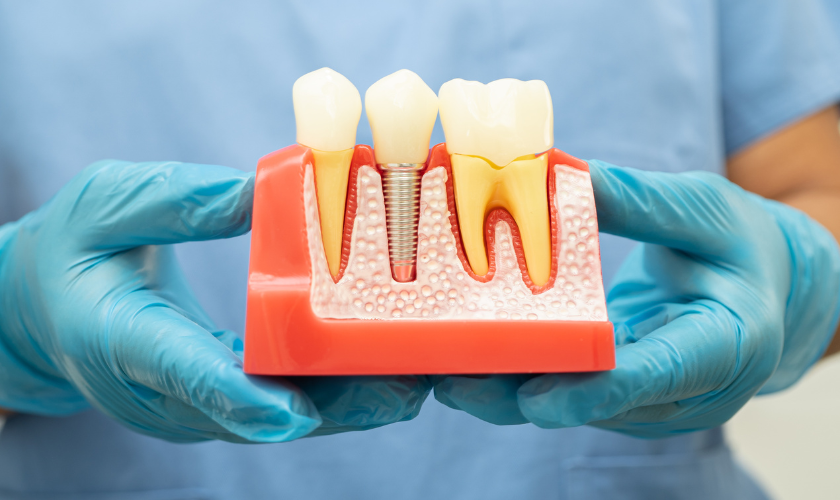4034 US-9 Howell, NJ 07731

Dental implants in Howell, NJ, are a long-term solution to tooth loss, and proper post-operative care plays a significant role in their success. While the initial recovery period may require dietary adjustments, it’s a small sacrifice for the many years of restored oral health and function that dental implants offer. This comprehensive guide will explore the timeline for resuming normal eating after dental implant surgery and provide valuable tips to ensure a smooth recovery process.
Understanding The Dental Implant Surgery Process
Before we delve into when you can eat normally again, it’s essential to understand the dental implant surgery process and how it affects your ability to eat certain foods.
- Initial Surgery: During the first phase of dental implant surgery, your dentist will make an incision in your gum to expose the jawbone. Then, they will drill a hole into the bone and place a titanium implant securely into it. This implant serves as a replacement for your natural tooth’s root.
- Healing and Osseointegration: After the implant placement, a crucial phase known as osseointegration begins. This is when the implant fuses with the surrounding jawbone, providing a stable foundation for the final restoration. Osseointegration typically takes several months, and protecting the implant during this period is crucial.
- Abutment and Restoration: Once osseointegration is complete, your dentist will attach an abutment to the implant. This abutment connects the implant to the final restoration, a crown, bridge, or denture. The restoration is customized to match your natural teeth, ensuring a seamless appearance.
The Initial Recovery Period
In the days immediately following your dental implant surgery, you will experience some discomfort and swelling. During this time, following your dentist’s post-operative instructions is essential. During the initial recovery period, your diet will be limited to soft foods to avoid any unnecessary pressure on the implant site.
Recommended Diet During the Initial Recovery
Soft Foods
Stick to a diet of soft foods like yogurt, applesauce, mashed potatoes, and pudding. Opt for soft, smooth textures that slide easily down the throat. Creamy soups, scrambled eggs, and cottage cheese are also good options. These foods are easy to chew and swallow, putting minimal stress on the healing surgical site. Soft foods prevent you from accidentally biting down too hard, which could damage the implants while they integrate with the jawbone.
Cold Foods
Cold foods like ice cream, popsicles, chilled fruit, and smoothies can help reduce swelling and relieve discomfort after surgery. The cold temperature constricts blood vessels, helping to keep inflammation down. Sipping on cold drinks and eating chilled foods can make recovery more comfortable. Avoid hot drinks or soup that could worsen swelling.
Avoid Crunchy and Hard Foods
Steer clear of crunchy or hard foods like chips, nuts, seeds, toast, raw veggies, and fried foods. Anything that needs extensive chewing could disrupt or dislodge the implants before fully fusing to the bone. Crunchy foods also require more jaw pressure, which can transfer force to the surgical site. Wait until your dentist gives the all-clear before eating these foods again.
Avoid Hot Foods and Drinks
Hot foods and beverages can increase blood flow to the surgical area, potentially leading to more significant swelling, inflammation, and discomfort. Spicy foods can also irritate the area. Stick to warm or room temperature foods and drinks rather than piping hot items for the first 1-2 weeks.
No Straws
Using straws creates suction in the mouth, loosening blood clots and disrupting the initial healing process after surgery. Avoiding straws entirely and sipping drinks slowly from a cup or glass is best. The suction can dislodge the implants, leading to complications.
Transitioning to Normal Eating
The timeline for transitioning back to your regular diet depends on your healing process. Your dentist will guide you on when it’s safe to reintroduce various foods, but here’s a general outline:
- Soft to Solid Foods: Typically, you can start adding softer solid foods like pasta, cooked vegetables, and tender meats to your diet after the first week or as advised by your dentist. Cut these foods into small, manageable pieces to minimize chewing effort.
- Avoid Chewing Near the Implant: Even as you progress to more solid foods, avoid chewing directly near the implant site. Instead, chew on the opposite side of your mouth to reduce stress on the surgical area.
- Gradual Introduction of Harder Foods: It may take a few weeks to a few months before you can comfortably eat crunchy or hard foods. Your dentist will monitor your progress and advise you accordingly.
- Maintaining Oral Hygiene: Throughout your recovery process, it’s essential to maintain excellent oral hygiene. Brush and floss gently, avoiding the implant area initially, and gradually incorporate it into your regular oral care routine as your dentist directs.
Getting dental implants in Howell, NJ, can be a great way to replace missing teeth and restore your smile. However, the recovery process after dental implant surgery can be challenging, especially regarding eating. If you’ve recently undergone dental implant surgery in Howell, NJ, you may be eager to return to your regular eating habits. While it may take some time and patience, you can eventually transition back to eating your favorite foods after you’ve healed from dental implant surgery. Please stick to the diet guidelines from your Howell dentist and take it slow when adding new foods back in. Proper care of your dental implants can last for many years to come and let you enjoy all the foods you love. The short-term sacrifice is worth it for the long-term benefits of a confident, healthy smile.



